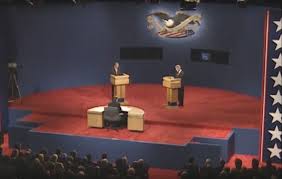by Joseph Shieber

As the quadrennial presidential and vice presidential debate season nears once more, we’ll soon see opinion pieces reminding us that debates have at most a very slight impact on the outcome of presidential contests.
Typically, the writers of those pieces frame their discussion as a warning not to place too much importance on the debates. I want to make a different argument about the presidential and vice presidential debates: we would do better to get rid of them altogether.
The crux of my argument against the presidential and vice presidential debates is that they don’t serve any of the audiences who might tune into them.
Those who follow politics already know the candidates’ track records and plans, so — as anyone familiar with the literature on the informativeness of job interviews can tell you — the debate doesn’t provide any salient information, just noise.
And what about those who aren’t informed consumers of political information? Focusing on the effect of debates on uninformed or undecided voters arguably distorts the discussion of the relative merits of the presidential candidates in ways that damage substantive coverage of political issues.
This is because, if they’re even watching the debates at all, uninformed or undecided voters are almost certainly focused on the wrong signals. Appreciating who refrained from perspiring, who wasn’t sighing annoyingly, or who had the snappiest one-line rebuttal doesn’t actually tell voters anything about who would promote policies that best represent those voters’ — and the country’s — interests.
And for the media, debates just provide another excuse to focus on horse race and style over track record and substance.
Perhaps, however, you think that performing well in a debate tells the voters about important qualities that the President will call upon once in office. Well if so, then what qualities?
Nobody would even begin to pretend that skill at debating tracks well with deeply held moral principle or selfless pursuit of the country’s well-being over one’s own ambition or interest. To see how ridiculous it would be to suppose otherwise, look no further than Princeton University’s 1992 North American Debating Championship Top Speaker, National Championship Top Speaker, Speaker of the Year, and member of the Team of the Year.
Certainly you wouldn’t suggest that skill at debating tracks intelligence, either. In the three example taken from frequently cited influential debates, the sick-looking and perspiring Nixon was almost certainly more intelligent than Kennedy. As for frequently sighing Gore vs. Bush and youthfully inexperienced Mondale vs. Reagan? It’s not even close.
Nor is it the case that Presidents have much occasion to deploy their debating skills on the world stage for the good of the country. Consider just two examples from the last four decades. It wasn’t Reagan’s one-liners that endeared him to Maggie Thatcher, but their shared love of deregulation and conservative economic principles. And it wasn’t W’s folksy charm that won Tony Blair’s support for the war in Iraq, but a shared sense of quasi-religious purpose and the shared horror over 9/11.
Maybe you think that the debates demonstrate which candidate is better able to communicate his or her core beliefs to the public. This may be true, but it is no virtue.
First, as already noted, it reinforces the view of many of the political media establishment that stories on personal and political style, as well as stories on the “state of the political race”, are worthwhile topics for endless column inches of bloviating.
Second, candidates have plenty of other opportunities to communicate their core beliefs to the public. That’s what campaigns are for. And given that the the job of the Presidency is to head the executive powers of the wealthiest country on earth, managing a multi-billion dollar campaign to inform the populace of who you are and what you want to accomplish is probably a better indication of your ability to perform the duties of President than performing for three hours under the hot lights of a televised debate stage at some rural college or university.
When I argue that we should get rid of the presidential and vice presidential debates, I’m not doing so without an appreciation for their entertainment value. When I was a child, I watched the debates alongside my parents, learning how to evaluate how the candidates were performing by gauging my parents’ smiles and nods, headshakes and groans.
But thinking about what generates the entertainment value of the debates is just further evidence that we don’t need them. What is entertaining about the debates is a vertiginous experience of higher level epistemic logic in real time. It’s watching “your” candidate performing while asking yourself, not “How is she doing?”, but “How will a few tens of thousands of uninformed voters in Wisconsin, Michigan, or Ohio perceive that she’s doing?”
Or it’s not, “What are his plans for dealing with health care, global climate change, or income inequality?”, but “I hope he sticks the landing.” As when watching a gymnast, you root for your favorite performer and hope the routine is a success, but the thrill is generated by the sinking feeling in the pit of your stomach that everything could go terribly wrong in an instant.
None of that, however, has anything remotely to do with a serious consideration of who is best fit to helm a country with a population of over 320 million people spread over a land mass of almost 4 million square miles and 7 time zones.
No, if you think that a series of televised debates is an important hurdle in choosing a president, then don’t be surprised if the coverage of political strategy and the horse race dominate coverage of policies and ideas. Don’t be surprised if complex solutions to complex problems fail to translate into fifteen second soundbites. Don’t be surprised if the guy the voters choose is some D-list primetime game show huckster for whom tens of thousand of unnecessary deaths and millions of lost jobs “is what it is”.
